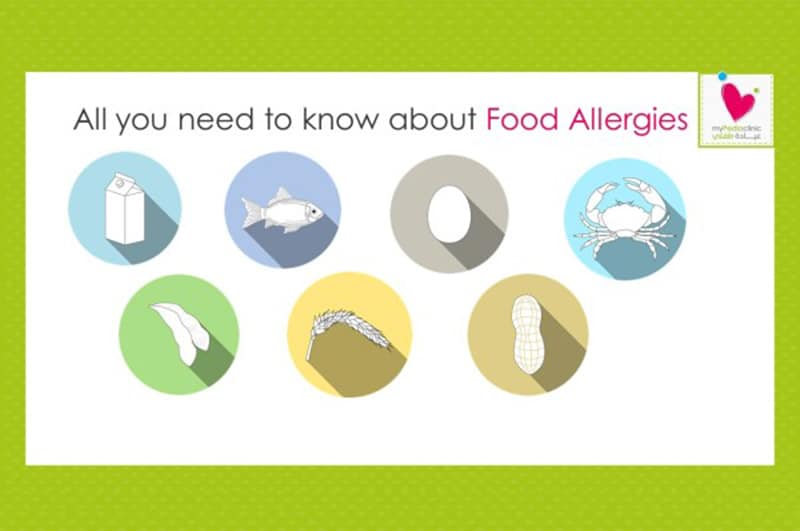Food Allergy in Children: Comprehensive Guide for Dubai Parents
Food allergies in children have become increasingly common worldwide, and Dubai is no exception. At myPediaClinic in Dubai Healthcare City (voted the best pediatric clinic in Dubai), we see multiple children with food allergies daily—numbers far higher than we observed just a decade ago. While the exact reasons behind this dramatic increase remain under investigation, what we know for certain is that parents need comprehensive, accurate information about recognizing, managing, and living with food allergies.
This complete guide, developed by Dr. Medhat Abu-Shaaban, American Board Certified Pediatrician and Allergy Expert, along with our nutritional team, provides everything Dubai parents need to know about food allergies in children—from understanding what food allergies are to managing them successfully in daily life.
What is a Food Allergy?
A food allergy occurs when the body’s immune system mistakenly identifies a harmless food protein as a dangerous invader, similar to how it would respond to a virus or bacteria. When a child with a food allergy eats (or sometimes even touches) the allergenic food, their immune system launches a protective response, releasing chemicals including histamine that cause allergic symptoms.
This immune response is fundamentally different from food intolerances or sensitivities, which don’t involve the immune system and are generally less serious. Understanding this distinction is crucial for proper diagnosis and management.
Why Are Food Allergies Increasing?
The dramatic rise in food allergies worldwide has puzzled researchers. While the exact causes remain unclear, several theories have been proposed:
- The Hygiene Hypothesis: Reduced exposure to microbes in early childhood may prevent proper immune system development
- Delayed Introduction of Allergens: Previous guidelines to delay allergenic foods may have contributed to increased allergies
- Vitamin D Deficiency: Low vitamin D levels may affect immune function and allergy development
- Changes in Food Processing: Modern food processing methods may alter protein structures
- Environmental Factors: Pollution and environmental toxins may influence immune responses
- Gut Microbiome Changes: Alterations in gut bacteria composition may affect allergy development
Despite these theories, the true cause likely involves complex interactions between genetic predisposition and environmental factors. What remains clear is that food allergies are a growing concern requiring increased awareness and proper management.
Types of Food Allergies: IgE-Mediated vs. Non-IgE-Mediated
Understanding the different types of food allergies helps parents recognize symptoms and seek appropriate treatment. Food allergies are broadly categorized into two main types based on the immune response involved.
IgE-Mediated Food Allergies (Immediate Reactions)
IgE-mediated allergies are what most people envision when thinking about food allergies. These reactions involve Immunoglobulin E (IgE) antibodies and typically occur rapidly—within minutes to two hours after eating the allergenic food.
Characteristics of IgE-Mediated Allergies:
- Rapid onset (usually within minutes, up to 2 hours)
- Visible reactions including hives, swelling, and rashes
- Can range from mild to severe (including anaphylaxis)
- Detectable through skin prick tests or blood tests measuring specific IgE antibodies
- Predictable—symptoms occur each time the food is consumed
Common IgE-Mediated Allergy Symptoms:
- Skin reactions (hives, eczema flares, swelling, redness)
- Respiratory symptoms (wheezing, coughing, difficulty breathing, throat tightness)
- Gastrointestinal symptoms (nausea, vomiting, diarrhea, stomach cramps)
- Cardiovascular symptoms (rapid heartbeat, low blood pressure, dizziness)
- Oral symptoms (itching or tingling of lips, tongue, mouth)
- Anaphylaxis (severe, whole-body allergic reaction that can be life-threatening)
Non-IgE-Mediated Food Allergies (Delayed Reactions)
Non-IgE-mediated allergies are less well-known but equally important to recognize. These reactions don’t involve IgE antibodies and typically have delayed onset, making them more challenging to identify.
Characteristics of Non-IgE-Mediated Allergies:
- Delayed onset (2-4 hours or even days after eating)
- Primarily gastrointestinal symptoms
- Generally not life-threatening but can cause chronic symptoms
- Not detectable through standard allergy tests (skin prick or IgE blood tests)
- Require elimination diets and food challenges for diagnosis
Common Non-IgE-Mediated Allergy Symptoms:
- Chronic diarrhea or constipation
- Persistent stomach pain and cramping
- Blood or mucus in stool
- Reflux and vomiting
- Poor growth or failure to thrive
- Irritability and discomfort after feeding
- Eczema (though this can also occur with IgE-mediated allergies)
Examples of Non-IgE-Mediated Conditions:
- Food Protein-Induced Enterocolitis Syndrome (FPIES)
- Food Protein-Induced Allergic Proctocolitis (FPIAP)
- Food Protein-Induced Enteropathy
- Celiac Disease (though technically an autoimmune condition, not a food allergy)
Mixed IgE and Non-IgE-Mediated Allergies
Some children experience both types of reactions to foods, combining immediate IgE-mediated symptoms with delayed gastrointestinal symptoms. Eosinophilic esophagitis (EoE) is an example of a condition involving both immune mechanisms. These mixed presentations can be particularly challenging to diagnose and manage.
Common Food Allergens in Children
While any food can theoretically cause an allergic reaction, eight foods account for approximately 90% of all food allergies in children. Understanding these common allergens helps parents remain vigilant.
The “Big Eight” Allergens
- Milk (Cow’s Milk Protein): Most common food allergy in infants and young children, often outgrown by school age
- Eggs: Very common in young children, frequently outgrown by adolescence
- Peanuts: Typically lifelong, though about 20% of children may outgrow
- Tree Nuts: (almonds, cashews, walnuts, etc.) Usually lifelong allergies
- Fish: (salmon, tuna, halibut) Typically lifelong allergies
- Shellfish: (shrimp, crab, lobster) Usually lifelong, often developing later in childhood or adulthood
- Wheat: Many children outgrow wheat allergies, different from celiac disease
- Soy: Common in infants, frequently outgrown
Additional Allergens Relevant in Dubai
Dubai’s multicultural environment means children may be exposed to additional allergens common in various cuisines:
- Sesame: Extremely common in Middle Eastern cuisine, increasingly recognized as a major allergen
- Mustard: Common in South Asian and European cuisines
- Lupin: Sometimes used in baked goods and pasta
- Molluscs: (clams, mussels, oysters)
- Buckwheat: Used in some Asian cuisines
- Kiwi, Banana, Avocado: Less common but significant allergies
Signs and Symptoms of Food Allergies in Children
Recognizing food allergy symptoms enables prompt treatment and prevents severe reactions. Symptoms vary widely between children and can affect multiple body systems.
Skin Symptoms
- Hives (urticaria)—red, raised, itchy welts anywhere on the body
- Angioedema—swelling of lips, tongue, eyelids, or other areas
- Eczema flare-ups or worsening of existing eczema
- Generalized redness or flushing
- Itching without visible rash
Respiratory Symptoms
- Runny or stuffy nose
- Sneezing
- Coughing or throat clearing
- Wheezing or difficulty breathing
- Tightness in the chest
- Hoarse voice or loss of voice
Gastrointestinal Symptoms
- Nausea and vomiting
- Stomach pain or cramping
- Diarrhea
- Constipation (particularly in non-IgE allergies)
- Blood or mucus in stool
- Reflux
- Difficulty swallowing
Cardiovascular Symptoms
- Rapid heartbeat
- Weak pulse
- Low blood pressure
- Dizziness or lightheadedness
- Fainting
Neurological Symptoms
- Confusion or disorientation
- Anxiety or sense of impending doom
- Loss of consciousness (in severe reactions)
Anaphylaxis: The Most Severe Reaction
Anaphylaxis is a severe, potentially life-threatening allergic reaction that requires immediate emergency treatment. It typically involves multiple body systems and can progress rapidly.
Signs of Anaphylaxis Include:
- Difficulty breathing or swallowing
- Swelling of throat or tongue
- Rapid, weak pulse
- Dizziness or loss of consciousness
- Severe drop in blood pressure
- Widespread hives or skin reaction
- Nausea, vomiting, or diarrhea
- Sense of doom or panic
If you suspect anaphylaxis, immediately administer epinephrine (if available), call emergency services (999 in Dubai), and seek emergency medical care even if symptoms improve after epinephrine administration.
Diagnosing Food Allergies in Children
Accurate diagnosis is essential for proper management. At myPediaClinic in Dubai Healthcare City, Dr. Medhat Abu-Shaaban uses comprehensive approaches to diagnose food allergies.
Medical History and Symptom Assessment
Diagnosis begins with detailed medical history including:
- Description of symptoms and their timing relative to eating
- Foods suspected of causing reactions
- Family history of allergies or allergic conditions
- Pattern of symptoms (consistent vs. occasional)
- Severity of reactions
- Growth and development patterns
Skin Prick Testing
Skin prick tests are commonly used for IgE-mediated allergies:
- Small amounts of suspected allergens are placed on the skin (usually forearm or back)
- Skin is pricked to allow allergen exposure
- Results are read after 15-20 minutes
- Positive results show raised, red bumps (wheals)
- High sensitivity but can produce false positives
- Quick, relatively painless, and safe
Blood Tests (Specific IgE Testing)
Blood tests measure IgE antibodies to specific foods:
- Requires blood draw but no skin exposure to allergens
- Can be done even when taking antihistamines (unlike skin tests)
- Results show antibody levels to each tested food
- Higher levels generally correlate with higher likelihood of clinical allergy
- Can produce false positives—positive test doesn’t always mean clinical allergy
- Cannot detect non-IgE-mediated allergies
Elimination Diets
For non-IgE-mediated allergies or unclear diagnoses:
- Suspected allergen is completely removed from diet for 2-6 weeks
- Symptoms are carefully monitored
- Improvement during elimination suggests food may be culprit
- Requires careful planning with nutritionist to ensure adequate nutrition
- Particularly important for diagnosing non-IgE-mediated allergies
Oral Food Challenges
Oral food challenges are the gold standard for confirming or ruling out food allergies:
- Performed in medical setting under close supervision
- Gradually increasing amounts of suspected allergen are given
- Patient is monitored for several hours
- Confirms whether food truly causes reactions
- Used when testing results are unclear or to determine if allergies have been outgrown
- Carries risk of reaction but provides definitive diagnosis
Limitations of Testing
Understanding test limitations is important:
- Positive tests don’t always mean clinical allergy (false positives are common)
- Negative tests usually mean no allergy, though false negatives occasionally occur
- Tests can’t predict severity of reactions
- Non-IgE-mediated allergies can’t be detected with standard allergy tests
- Test results must be interpreted by experienced allergists in context of clinical history
Managing Food Allergies: Complete Avoidance
Once a food allergy is diagnosed, strict avoidance of the allergen is the primary management strategy. Unlike many medical conditions that can be treated with medication, there’s no cure for food allergies—prevention through avoidance is key.
Reading Labels Carefully
Label reading is a crucial skill for managing food allergies:
- Read complete ingredient lists every time, even for familiar products
- Learn all names and forms of your child’s allergens
- Watch for precautionary allergen labeling (“may contain,” “produced in a facility with”)
- Be cautious with products without complete ingredient lists
- Contact manufacturers when uncertain about ingredients
- In Dubai, imported products may have labels in multiple languages—read all of them
Avoiding Cross-Contamination
Cross-contamination occurs when a safe food comes into contact with an allergen:
- Use separate cutting boards, utensils, and cookware for allergen-free foods
- Clean surfaces thoroughly before preparing allergen-free meals
- Store allergenic and allergen-free foods separately
- Avoid shared fryers (like in restaurants) where allergens may contaminate oil
- Be cautious with bulk bins where different foods touch
- Wash hands thoroughly after handling allergens
Dining Out Safely
Restaurant dining requires extra vigilance:
- Research restaurants before visiting
- Call ahead to discuss allergies during non-peak hours
- Inform servers about allergies immediately and emphasize severity
- Ask to speak with chef or manager
- Clarify cross-contamination prevention measures
- In Dubai, language barriers may exist—consider allergy cards in multiple languages
- When in doubt, don’t eat—it’s not worth the risk
School and Childcare Management
Dubai schools and nurseries vary in their allergy policies:
- Provide written documentation of allergies to schools
- Supply emergency action plans with clear instructions
- Ensure epinephrine auto-injectors are available at school
- Train staff on recognizing reactions and administering medication
- Pack safe lunches and snacks from home
- Educate your child about their allergies age-appropriately
- Communicate regularly with teachers about food-related activities
Emergency Preparedness: Treating Allergic Reactions
Being prepared for allergic reactions can save lives. Every family managing food allergies should have clear action plans.
Mild to Moderate Reactions
For mild symptoms (few hives, mild itching):
- Administer antihistamine (as directed by your doctor)
- Stop eating immediately
- Monitor closely for progression to severe symptoms
- Contact your healthcare provider for guidance
- Don’t give future doses of the allergenic food
Severe Reactions (Anaphylaxis)
For severe symptoms (difficulty breathing, swelling, widespread hives):
- Immediately administer epinephrine auto-injector (EpiPen, Jext, or equivalent)
- Call emergency services (999 in Dubai)
- Position person lying flat (unless vomiting or having breathing difficulty, then sitting)
- Administer second dose of epinephrine after 5-15 minutes if symptoms don’t improve
- Seek emergency medical care even if symptoms improve—reactions can be biphasic (returning)
Epinephrine Auto-Injectors
Families managing severe food allergies should always carry epinephrine:
- Obtain prescriptions from Dr. Medhat Abu-Shaaban at myPediaClinic
- Carry two auto-injectors at all times (in case one malfunctions or second dose is needed)
- Ensure all caregivers know how to use them
- Check expiration dates regularly and replace expired devices
- Keep auto-injectors at appropriate temperature (avoid extreme heat in Dubai)
- Practice with trainer devices so you’re comfortable with technique
Written Emergency Action Plans
Food Allergy Emergency Action Plans should include:
- Child’s photo for identification
- List of specific allergens
- Symptoms of allergic reactions
- Step-by-step treatment instructions
- Emergency contact information
- Healthcare provider information and signature
Provide copies to schools, daycares, relatives, and anyone who supervises your child.
Nutritional Management: Replacing Missing Nutrients
Eliminating foods from your child’s diet raises nutritional concerns. Working with a nutritionist ensures your child receives adequate nutrition despite food restrictions.
At myPediaClinic in Dubai Healthcare City, our nutritional specialists provide individualized counseling to replace nutrients from eliminated foods with safe alternatives. Proper nutrition is especially critical during childhood growth and development.
Nutritional Concerns by Eliminated Food
Milk Allergy:
Concerns: Calcium, vitamin D, protein, vitamin B12, riboflavin
Alternatives: Fortified plant milks, leafy greens, calcium-set tofu, fortified orange juice, sardines with bones, supplements if needed
Egg Allergy:
Concerns: Protein, choline, vitamin B12, vitamin D, selenium
Alternatives: Meat, poultry, fish, legumes, fortified foods, Brazil nuts (if not nut-allergic)
Wheat Allergy:
Concerns: B vitamins, iron, fiber (from whole wheat)
Alternatives: Fortified gluten-free products, quinoa, rice, other whole grains, fruits, vegetables, lean meats
Nut Allergy:
Concerns: Healthy fats, protein, vitamin E, minerals
Alternatives: Seeds (sunflower, pumpkin), avocados, fish, fortified foods
Growth Monitoring
Regular monitoring ensures adequate nutrition:
- Track growth parameters (height, weight) at regular check-ups
- Monitor developmental milestones
- Consider periodic blood tests for nutritional deficiencies
- Adjust dietary plans as needs change with growth
- Work closely with myPediaClinic’s nutritional team
Will My Child Outgrow Their Food Allergy?
One of the most common questions parents ask is whether their child will outgrow their food allergy. The answer depends on the specific allergen and individual factors.
Allergies Commonly Outgrown
Milk Allergy: Approximately 80% of children outgrow by age 16, many much earlier
Egg Allergy: About 70-80% outgrow by age 16, though tolerance may develop gradually
Soy Allergy: Most children outgrow soy allergies by school age
Wheat Allergy: The majority outgrow by adolescence
Allergies Typically Lifelong
Peanut Allergy: About 20% may outgrow, but most remain allergic lifelong
Tree Nut Allergies: Usually lifelong, though about 10% may outgrow
Fish and Shellfish Allergies: Typically lifelong
Sesame Allergy: Less likely to be outgrown
Monitoring for Allergy Resolution
Regular testing can determine if allergies have resolved:
- Schedule periodic allergy testing with Dr. Medhat Abu-Shaaban
- Declining IgE antibody levels may indicate potential tolerance
- Oral food challenges confirm whether allergy has resolved
- Never attempt reintroduction at home without medical supervision
- Even if testing suggests tolerance, first reintroduction should be supervised
Comprehensive FAQ About Food Allergies
What’s the difference between food allergy and food intolerance?
Food allergies involve the immune system and can cause severe, potentially life-threatening reactions. Food intolerances (like lactose intolerance) involve the digestive system, causing uncomfortable symptoms like bloating and diarrhea but not dangerous reactions. Allergies require complete avoidance, while intolerances may be managed with smaller portions or digestive aids.
Can my child develop food allergies they didn’t have before?
Yes, food allergies can develop at any age, though they most commonly develop in early childhood. Some allergies, particularly to shellfish and fish, more commonly develop later in childhood or even adulthood. If your child develops new symptoms after eating foods they previously tolerated, consult Dr. Medhat Abu-Shaaban at myPediaClinic for evaluation.
Are food allergies hereditary?
Food allergies have a genetic component. Children with one parent with food allergies have approximately 40% risk of developing food allergies; if both parents have allergies, the risk increases to 60-80%. However, the specific allergies don’t necessarily run in families—a parent allergic to peanuts might have a child allergic to milk.
Can breastfeeding prevent or cause food allergies?
Breastfeeding generally provides protective benefits and is recommended for at least the first 6 months. While mothers don’t need to avoid allergenic foods during breastfeeding, in some cases of non-IgE-mediated allergies in breastfed infants, maternal dietary elimination may be recommended. However, routine avoidance isn’t necessary and may be counterproductive.
What should I do if my child accidentally eats their allergen?
If accidental exposure occurs, follow your emergency action plan. For mild symptoms, give antihistamine and monitor closely. For severe symptoms (difficulty breathing, widespread hives, vomiting, dizziness), immediately use epinephrine auto-injector, call 999, and seek emergency care. Always seek medical evaluation after accidental exposure, even if symptoms were mild.
Can food allergies be cured?
Currently, there’s no cure for food allergies. The primary treatment is strict avoidance. However, research into oral immunotherapy (OIT) and other desensitization approaches shows promise. Some centers offer these experimental treatments, though they’re not yet standard care and carry risks. Discuss potential options with Dr. Medhat Abu-Shaaban if you’re interested in emerging treatments.
How do I handle birthday parties and social events with food allergies?
Communicate with hosts beforehand about your child’s allergies, offer to provide safe treats, send your child with pre-approved snacks, and for young children, consider staying at the party to supervise. Host your own parties with allergy-safe foods for all guests. Focus on activities rather than food to reduce allergy concerns.
Should I keep the allergen completely out of my home?
Many families find it easier to maintain allergen-free homes, eliminating accidental exposures and cross-contamination. Others choose to allow allergens for other family members with careful precautions. The decision depends on your child’s sensitivity, age, and family situation. Discuss with your healthcare team at myPediaClinic about what’s appropriate for your family.
What allergy testing is most accurate?
Oral food challenges under medical supervision are the gold standard for diagnosis. Skin prick tests and blood tests are helpful screening tools but can produce false positives. Test results must be interpreted by experienced allergists like Dr. Medhat Abu-Shaaban in context of clinical history and symptoms. No single test is perfect—diagnosis requires comprehensive assessment.
Can my child with food allergies receive vaccinations?
Most children with food allergies can safely receive all recommended vaccines. Egg allergy previously raised concerns about flu and yellow fever vaccines (grown in eggs), but current vaccines contain minimal egg protein and are generally safe even for egg-allergic children. Discuss your child’s specific allergies with healthcare providers before vaccination.
How do I teach my child to manage their own food allergy?
Age-appropriate education is key. Young children should learn simple rules like “only eat foods approved by parents.” School-age children should learn to read labels, recognize symptoms, and communicate their needs. Teenagers need complete independence—recognizing symptoms, carrying and using epinephrine, and advocating in social situations. Gradually increase responsibility as your child matures.
What resources are available for food allergy families in Dubai?
Dubai offers numerous resources including specialized healthcare at myPediaClinic, support groups for allergy families, international schools with allergy protocols, restaurants accommodating allergies, and supermarkets with allergen-free product sections. Online communities connect local families managing allergies. MyPediaClinic can help connect you with relevant resources.
Can stress or exercise affect food allergy reactions?
Yes, both can be cofactors. Food-dependent exercise-induced anaphylaxis occurs when eating a specific food followed by exercise triggers reaction, though neither alone causes symptoms. Stress may potentially worsen reactions. If your child experiences reactions in these contexts, discuss appropriate precautions with Dr. Medhat Abu-Shaaban at myPediaClinic.
Should siblings be tested if one child has food allergies?
Siblings have increased allergy risk due to genetics, but routine testing without symptoms isn’t usually recommended. However, if siblings develop symptoms suggesting allergies, testing is appropriate. Some families choose early introduction protocols for siblings to potentially reduce allergy risk. Discuss with myPediaClinic about appropriate approaches for siblings.
How do I manage food allergies during travel from Dubai?
Plan ahead by researching food options at your destination, packing safe snacks and meals, carrying medications including extra epinephrine, bringing translated allergy cards in local languages, knowing locations of hospitals, and informing airlines about allergies. Consider travel insurance covering emergency medical care. MyPediaClinic can provide travel documentation and advice.
What’s the difference between food allergy testing and food sensitivity testing?
“Food sensitivity” tests measuring IgG antibodies are not validated for diagnosing food allergies and are not recommended by allergists. Legitimate food allergy testing measures IgE antibodies (blood tests) or performs skin prick testing, always interpreted by experienced allergists. Be cautious of alternative testing methods not backed by scientific evidence.
Can eczema be caused by food allergies?
Food allergies can trigger or worsen eczema in some children, though eczema has multiple causes. If your child has both eczema and food allergies, managing allergies may improve skin symptoms. However, eliminating foods based only on eczema without confirming food allergy through testing can lead to unnecessary dietary restrictions. Consult myPediaClinic for proper evaluation.
How long after eating an allergen do symptoms appear?
IgE-mediated reactions typically occur within minutes to 2 hours after exposure. Non-IgE-mediated reactions may be delayed by 2-4 hours or even longer. Some symptoms like eczema flares may appear hours to days later. The timing of symptom onset helps determine the type of allergic reaction and guides diagnosis.
Can food allergies affect my child’s growth and development?
Poorly managed food allergies can affect growth if allergic reactions cause chronic inflammation, if multiple food eliminations lead to nutritional inadequacy, or if non-IgE-mediated allergies cause chronic gastrointestinal symptoms. This is why working with nutrition specialists at myPediaClinic is crucial to ensure adequate nutrition despite food restrictions, and monitoring growth regularly.
Should I use precautionary allergen labels (“may contain”) as a guide?
Precautionary allergen labeling indicates potential cross-contamination risk. Whether to avoid these products depends on your child’s sensitivity level and should be discussed with Dr. Medhat Abu-Shaaban. Some families avoid all “may contain” products, while others with less sensitive children may accept the risk. There’s no universal answer—it’s an individual decision made with medical guidance.
Expert Food Allergy Care at myPediaClinic Dubai
Managing food allergies requires expertise, support, and ongoing care. At myPediaClinic in Dubai Healthcare City (voted the best pediatric clinic in Dubai), we provide comprehensive food allergy services:
- Expert diagnosis by Dr. Medhat Abu-Shaaban, American Board Certified Pediatrician and Allergy Expert
- Comprehensive allergy testing (skin prick tests, blood tests)
- Oral food challenges when appropriate
- Individualized nutritional counseling
- Emergency action plan development
- Epinephrine auto-injector prescriptions and training
- School communication and documentation
- Regular monitoring and retesting
- Support for families throughout the allergy journey
Our team understands the challenges of managing food allergies in Dubai’s diverse, international environment and provides culturally sensitive, personalized care for each family.
Take Control of Your Child’s Food Allergies Today
Living with food allergies presents challenges, but with proper diagnosis, management, and support, children with food allergies can thrive. Whether you suspect your child has a food allergy, have recently received a diagnosis, or need better management strategies, the expert team at myPediaClinic in Dubai Healthcare City is here to help.
Don’t navigate food allergies alone. Contact myPediaClinic today to schedule a consultation with Dr. Medhat Abu-Shaaban and our nutritional specialists. We provide the expertise, testing, management plans, and ongoing support your family needs to successfully manage food allergies and ensure your child’s optimal health and nutrition.
Call myPediaClinic at 04 430 5926 to schedule your food allergy consultation. Located in Dubai Healthcare City, we’re committed to providing the best pediatric allergy care in Dubai.





